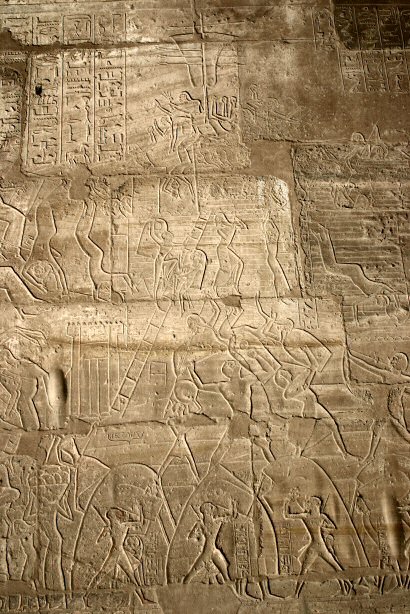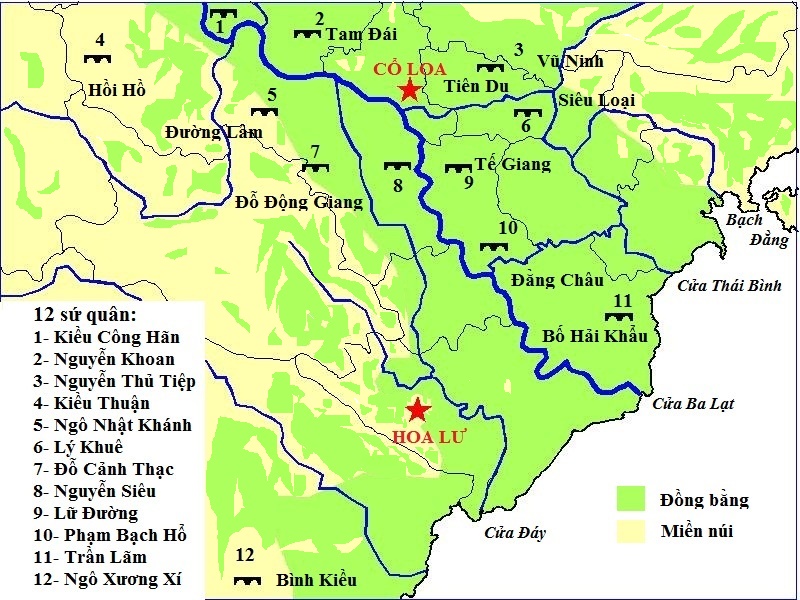|
Song–Đại Cồ Việt War
The Song–Đại Cồ Việt war was a military conflict between the Song dynasty and Đại Cồ Việt in 981. It resulted in a victory for Đại Cồ Việt over the Song forces. Background In the late 9th century, the then-Tang dynasty administered territory of Jinghai Circuit slipped away from Chinese control and a succession of local Viet chieftains and warlords ruled it autonomously until 939 when Ngô Quyền abolished the circuit and proclaimed himself king. Their power waned with Ngô Quyền's death in 944 and a civil war in 958 that split the realm into the domains of Anarchy of the 12 Warlords, twelve warlords. In 968, Đinh Bộ Lĩnh, a warlord based in Hoa Lư, defeated the other warlords and named the realm Đại Cồ Việt. The Song dynasty bestowed titles upon Đinh Bộ Lĩnh such as the ''King of Jiaozhi'' (quận vương), ''King of Annam province'', and ''Peaceful Sea Military Governor''. In 971, the Song emperor ordered the subjugation of Lingnan (the la ... [...More Info...] [...Related Items...] OR: [Wikipedia] [Google] [Baidu] |
Đại Việt
Đại Việt (, ; literally Great Việt), often known as Annam ( vi, An Nam, Chữ Hán: 安南), was a monarchy in eastern Mainland Southeast Asia from the 10th century AD to the early 19th century, centered around the region of present-day Hanoi, Northern Vietnam. Its early name, Đại Cồ Việt,( Hán tự: 大瞿越) was established in 968 by Vietnamese ruler Đinh Bộ Lĩnh after he ended the Anarchy of the 12 Warlords, until the beginning of the reign of Lý Thánh Tông (r. 1054–1072), the third emperor of the Lý dynasty. Đại Việt lasted until the reign of Gia Long (r. 1802–1820), the first emperor of the Nguyễn dynasty, when the name was changed to Việt Nam. Đại Việt's history is divided into the rule of eight dynasties: Đinh (968–980), Early Lê (980–1009), Lý (1009–1226), Trần (1226–1400), Hồ (1400–1407), and Later Lê (1428–1789); the Mạc dynasty (1527–1677); and the brief Tây Sơn dynasty (1778–1802). It was bri ... [...More Info...] [...Related Items...] OR: [Wikipedia] [Google] [Baidu] |
D∆∞∆°ng V√¢n Nga
D∆∞∆°ng Th·ªã Ng·ªçc V√¢n (Ê•äÊ∞èÁéâÈõ≤, ?‚Äì1000) courtesy name V√¢n Nga (Èõ≤®•) was the only empress dowager of the ƒêinh dynasty and afterwards empress of L√™ ƒê·∫°i H√Ýnh, the first emperor of the Early L√™ dynasty. When her husband ƒêinh Ti√™n Ho√Ýng was assassinated in 979, D∆∞∆°ng V√¢n Nga became the Empress Dowager of the ƒêinh dynasty as her son ƒêinh Ph·∫ø ƒê·∫ø succeeded the throne. During the short-lived reign of ƒêinh Ph·∫ø ƒê·∫ø, D∆∞∆°ng V√¢n Nga and the general L√™ Ho√Ýn jointly held the regentship for the 6-year-old emperor, later it was D∆∞∆°ng V√¢n Nga and general Ph·∫°m C·ª± L∆∞·ª£ng who decided to cede the ƒêinh dynasty's throne for L√™ Ho√Ýn in 980 so that ƒê·∫°i C·ªì Vi·ªát could stand the Song dynasty's invasion with a capable ruler. Subsequently, L√™ Ho√Ýn entitled D∆∞∆°ng V√¢n Nga as his empress, hence she became the first woman in the history of Vietnam to be married to two emperors. Biography ƒêinh dynasty According to some sources, D∆∞∆°ng V√¢n Ng ... [...More Info...] [...Related Items...] OR: [Wikipedia] [Google] [Baidu] |
10th Century In Vietnam
1 (one, unit, unity) is a number representing a single or the only entity. 1 is also a numerical digit and represents a single unit of counting or measurement. For example, a line segment of ''unit length'' is a line segment of length 1. In conventions of sign where zero is considered neither positive nor negative, 1 is the first and smallest positive integer. It is also sometimes considered the first of the infinite sequence of natural numbers, followed by 2, although by other definitions 1 is the second natural number, following 0. The fundamental mathematical property of 1 is to be a multiplicative identity, meaning that any number multiplied by 1 equals the same number. Most if not all properties of 1 can be deduced from this. In advanced mathematics, a multiplicative identity is often denoted 1, even if it is not a number. 1 is by convention not considered a prime number; this was not universally accepted until the mid-20th century. Additionally, 1 is the s ... [...More Info...] [...Related Items...] OR: [Wikipedia] [Google] [Baidu] |
Wars Involving The Đại Việt Kingdom
War is an intense armed conflict between states, governments, societies, or paramilitary groups such as mercenaries, insurgents, and militias. It is generally characterized by extreme violence, destruction, and mortality, using regular or irregular military forces. Warfare refers to the common activities and characteristics of types of war, or of wars in general. Total war is warfare that is not restricted to purely legitimate military targets, and can result in massive civilian or other non-combatant suffering and casualties. While some war studies scholars consider war a universal and ancestral aspect of human nature, others argue it is a result of specific socio-cultural, economic or ecological circumstances. Etymology The English word ''war'' derives from the 11th-century Old English words ''wyrre'' and ''werre'', from Old French ''werre'' (also ''guerre'' as in modern French), in turn from the Frankish *''werra'', ultimately deriving from the Proto-Germanic *''we ... [...More Info...] [...Related Items...] OR: [Wikipedia] [Google] [Baidu] |
Wars Involving Vietnam
War is an intense armed conflict between states, governments, societies, or paramilitary groups such as mercenaries, insurgents, and militias. It is generally characterized by extreme violence, destruction, and mortality, using regular or irregular military forces. Warfare refers to the common activities and characteristics of types of war, or of wars in general. Total war is warfare that is not restricted to purely legitimate military targets, and can result in massive civilian or other non-combatant suffering and casualties. While some war studies scholars consider war a universal and ancestral aspect of human nature, others argue it is a result of specific socio-cultural, economic or ecological circumstances. Etymology The English word ''war'' derives from the 11th-century Old English words ''wyrre'' and ''werre'', from Old French ''werre'' (also ''guerre'' as in modern French), in turn from the Frankish *''werra'', ultimately deriving from the Prot ... [...More Info...] [...Related Items...] OR: [Wikipedia] [Google] [Baidu] |
Wars Involving The Song Dynasty
War is an intense armed conflict between states, governments, societies, or paramilitary groups such as mercenaries, insurgents, and militias. It is generally characterized by extreme violence, destruction, and mortality, using regular or irregular military forces. Warfare refers to the common activities and characteristics of types of war, or of wars in general. Total war is warfare that is not restricted to purely legitimate military targets, and can result in massive civilian or other non-combatant suffering and casualties. While some war studies scholars consider war a universal and ancestral aspect of human nature, others argue it is a result of specific socio-cultural, economic or ecological circumstances. Etymology The English word ''war'' derives from the 11th-century Old English words ''wyrre'' and ''werre'', from Old French ''werre'' (also ''guerre'' as in modern French), in turn from the Frankish *''werra'', ultimately deriving from the Proto-Germanic *'' ... [...More Info...] [...Related Items...] OR: [Wikipedia] [Google] [Baidu] |
Oxford University Press
Oxford University Press (OUP) is the university press of the University of Oxford. It is the largest university press in the world, and its printing history dates back to the 1480s. Having been officially granted the legal right to print books by decree in 1586, it is the second oldest university press after Cambridge University Press. It is a department of the University of Oxford and is governed by a group of 15 academics known as the Delegates of the Press, who are appointed by the vice-chancellor of the University of Oxford. The Delegates of the Press are led by the Secretary to the Delegates, who serves as OUP's chief executive and as its major representative on other university bodies. Oxford University Press has had a similar governance structure since the 17th century. The press is located on Walton Street, Oxford, opposite Somerville College, in the inner suburb of Jericho. For the last 500 years, OUP has primarily focused on the publication of pedagogical texts and ... [...More Info...] [...Related Items...] OR: [Wikipedia] [Google] [Baidu] |
Taylor & Francis
Taylor & Francis Group is an international company originating in England that publishes books and academic journals. Its parts include Taylor & Francis, Routledge, F1000 (publisher), F1000 Research or Dovepress. It is a division of Informa, Informa plc, a United Kingdom–based publisher and conference company. Overview The company was founded in 1852 when William Francis (chemist), William Francis joined Richard Taylor (editor), Richard Taylor in his publishing business. Taylor had founded his company in 1798. Their subjects covered agriculture, chemistry, education, engineering, geography, law, mathematics, medicine, and social sciences. Francis's son, Richard Taunton Francis (1883–1930), was sole partner in the firm from 1917 to 1930. In 1965, Taylor & Francis launched Wykeham Publications and began book publishing. T&F acquired Hemisphere Publishing in 1988, and the company was renamed Taylor & Francis Group to reflect the growing number of Imprint (trade name), imp ... [...More Info...] [...Related Items...] OR: [Wikipedia] [Google] [Baidu] |
Ngô Nhật Khánh
Ng√¥ Nh·∫≠t Kh√°nh ( vi-hantu, Âê≥Êó•ÊÖ∂, died 979), formally Prince An (ÂÆâÁéã), was a Vietnamese warlord during the Period of the 12 Warlords. Kh√°nh was a grandson of Ng√¥ Quy·ªÅn. He occupied ƒê∆∞·ªùng L√¢m (modern S∆°n T√¢y, Hanoi), and titled himself Ng√¥ L√£m C√¥ng (Âê≥˶ΩÂÖ¨).''Vi·ªát Nam s·ª≠ l∆∞·ª£c'', Quy·ªÉn 1, Ph·∫ßn 3, Ch∆∞∆°ng 1''ƒê·∫°i Vi·ªát s·ª≠ k√Ω to√Ýn th∆∞'', Peripheral Records vol. 5 Kh√°nh was defeated by ƒêinh B·ªô Lƒ©nh in 968. ƒêinh B·ªô Lƒ©nh married his mother. Kh√°nh also married a daughter of ƒêinh B·ªô Lƒ©nh, and one of his sisters married ƒêinh Li·ªÖn. But Kh√°nh hated ƒêinh B·ªô Lƒ©nh intensely. He subsequently took his wife and children and hastened to Champa. Arriving at a seaport on the southern border, he drew a dagger from his waist and slashed his wife‚Äôs face, scolding her by saying: "Your father coerced and ravished my mother and younger sister; how can I, just because of you, forget your father‚Äôs cruelty? You go back; I will go a ... [...More Info...] [...Related Items...] OR: [Wikipedia] [Google] [Baidu] |
Champa
Champa (Cham: Í®åÍ©åÍ®õÍ®©; km, ·ûÖ·û∂·ûò·üí·ûî·üâ·û∂; vi, Chi√™m Th√Ýnh or ) were a collection of independent Cham polities that extended across the coast of what is contemporary central and southern Vietnam from approximately the 2nd century AD until 1832, when it was annexed by the Vietnamese Empire under its emperor Minh M·∫°ng. The kingdom was known variously as ''Nagaracampa'' ( sa, ý§®ý§óý§∞ý§öý§Æý•çý§™ý§É), ''Champa'' (Í®åÍ©åÍ®õÍ®©) in modern Cham, and ''Ch√¢mpa'' () in the Khmer inscriptions, ''Chi√™m Th√Ýnh'' in Vietnamese and ''Zh√Ýnch√©ng'' (Mandarin: ÂçÝÂüé) in Chinese records. The Kingdoms of Champa and the Chams contribute profound and direct impacts to the history of Vietnam, Southeast Asia, as well as their present day. Early Champa, evolved from local seafaring Austronesian Chamic Sa Hu·ª≥nh culture off the coast of modern-day Vietnam. The emergence of Champa at the late 2nd century AD shows testimony of early Southeast Asian statecrafting and crucial ... [...More Info...] [...Related Items...] OR: [Wikipedia] [Google] [Baidu] |




.jpg)
.jpg)

